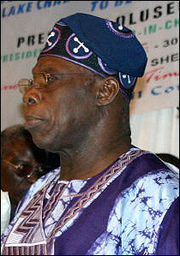


Posted by AFP on



Nigeria struck a deal with the Paris Club of creditor countries to wipe clean two-thirds of its 30-billion-dollar (25-billion-euro) debt and pay back the rest from its surging oil revenues.
Nigeria struck a deal with the Paris Club of creditor countries to wipe clean two-thirds of its 30-billion-dollar (25-billion-euro) debt and pay back the rest from its surging oil revenues.
President Olusegun Obasanjo expressed delight at the long-sought agreement, which he said would help Africa's most populous country press on with economic reform without the burden of massive interest payments.
"It is with great joy that I address you today on one of the pillars of success of this administration... The total write-off is close to 20 billion dollars," Obasanjo said in a televised address to the nation.
The president blamed the "criminal corruption, mismanagement and waste" of previous regimes for building up the debt, and vowed to plough an extra billion dollars into education, health, agriculture, water and power next year.
Finance Minister Ngozi Okonjo-Iweala explained that Nigeria would quickly repay six billion dollars to the countries represented in the Paris Club, which would in turn wipe out around two-thirds of the huge total debt.
"We expect to pay off the balance during the buy-back operation," she said, adding that Nigeria will meet with its creditors in September to set a timetable for settling the remainder of the package.
Nigeria is home to more than 130 million people, more than three-quarters of whom live on less than a dollar per day, and Obasanjo's civilian government has found it impossible to repay the sums borrowed by previous military regimes.
But burgeoning oil revenues -- Nigeria is Africa's biggest exporter with 2.5 million barrels per day and world prices are close to record highs -- have given Okonjo-Iweala's respected economics team an opportunity to end the cycle.
A statement from the Paris Club, released in Paris, confirmed that the group has agreed in principle to open talks on "comprehensive debt treatment".
Britain is Nigeria's biggest creditor, holding seven billion dollars, and has taken the lead in persuading other countries that the time has come to show support for Obasanjo's slow reform programme by cancelling the loans.
"The implementation of the economic reform programme provided the strong anchor for the renewed efforts of the government to persuade the creditors to listen to Nigeria's case for debt relief," Okonjo-Iweala said.
The finance minister, a former World Bank vice president who returned from Washington to head Obasanjo's economic team in 2003, plans to deregulate the economy, privatize state businesses and clean up murky public accounts.
At a meeting on Wednesday, Club creditors noted "the economic reform program implemented by the Nigerian authorities since 2003 and of their willingness to take advantage of exceptional revenues in order to finance an exit treatment."
When Nigeria concludes a policy support instrument with the International Monetary Fund, the Club will reduce the debt according to so-called Naples Terms "on eligible debts and a buy back at a market-related discount".
The "Naples Terms" arise from a Paris Club agreement in December 1994 for new treatment of the debt owed by the poorest countries.
Creditors agreed in September 1999 that all Naples Terms treatments would involve debt reduction of 67.0 percent.
Arrangements for the remaining stock of debt are made, on a case-by-case basis, for countries having established a satisfactory track record with both the Paris Club and IMF and proven that they are capable of paying.
The Paris Terms state that remaining debt may then be "re-scheduled at the appropriate market rate" according to a standard table involving a 23-year repayment period with an initial period of six years free of payment.
After Britain, France is Nigeria's next biggest creditor with 5.6 billion dollars and Germany with 4.6 billion. Nigeria owes around another five billion to non-sovereign creditors outside the Paris Club.

